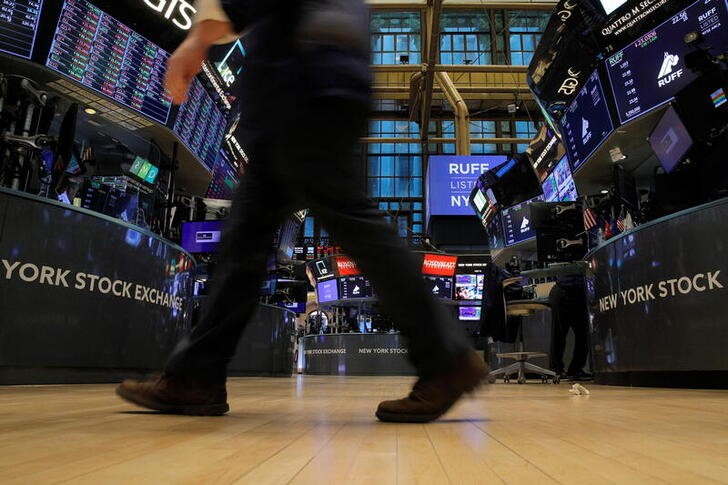By Geoffrey Smith
Investing.com -- Solid earnings from Nike lifted the sportswear maker and are set to lift U.S. markets broadly at the open. Ukraine's President Volodymyr Zelenskyy is set to address Congress in person later, his first trip outside his country since Russia's invasion 10 months ago. Elon Musk is planning to resign as Twitter CEO just as soon as he can find "someone foolish enough" to want the job, and oil prices hit their highest in a week on signs that the U.S. government's switch from seller to buyer and G7 measures against Russia are tightening crude availability. Here's what you need to know in financial markets on Wednesday, 21st December.
1. Nike earnings cheer as inventories fall
Nike (NYSE:NKE) shares leaped after the sports gear giant said it had made good progress in whittling down excess inventory over the last three months.
Nike reported a chunky 27% rise in constant-currency sales in the last three months late on Thursday and net income 30% ahead of expectations, with markdowns in North America particularly useful in shifting excess stock.
It consequently raised its guidance for full-year.
As Nike goes, so goes the global consumer? Maybe that’s a bit of an exaggeration, but the world’s largest maker of sportswear isn’t the worst proxy for consumer discretionary spending. Rivals Adidas (ETR:ADSGN) and Puma (ETR:PUMG) both gained in European morning trading in sympathy, as did U.K. retailer JD Sports (LON:JD).
2. Zelenskyy in Washington, Medvedev in Beijing
Ukrainian President Volodymyr Zelenskyy is to address the U.S. Congress in person later Wednesday, his first trip outside Ukraine since Russia invaded the country over 300 days ago.
Zelenskyy is expected to ask the U.S. for Lockheed Martin's (NYSE:LMT) state-of-the-art long-range rocket artillery system, the so-called ATACMS, which would give the country much greater capability to strike targets in Russia, from where the drone and missile strikes against Ukraine’s energy and water infrastructure are being launched.
The U.S. has so far resisted less public pressure for the ATACMS to be included in U.S. military aid, fearing escalation of the conflict.
Overnight, Russia’s former President Dmitry Medvedev made an unannounced visit to Beijing for what he called “thoroughly useful” talks with President Xi Jinping. Chinese state TV said Xi had told Medvedev he is actively seeking “peace and talks” to end a war that is increasingly becoming a drag on Chinese exporters, while cementing Chinese-Russian trade links.
3. Stocks set to open higher; home sales, consumer confidence data eyed
U.S. stock markets are set to open higher later, building on Tuesday’s stabilization as the shock from a tightening of Japanese monetary policy was absorbed.
By 06:30 ET (11:30 GMT), Dow Jones futures were up 272 points or 0.8%, while S&P 500 futures were up 0.6%, and Nasdaq 100 futures were up 0.4%, with the results from Nike clearly helping the tone.
Other stocks likely to be in focus later include FedEx (NYSE:FDX), whose quarterly update late on Tuesday wasn’t half as impressive.
Cintas (NASDAQ:CTAS) reports earnings early, while chipmaker Micron (NASDAQ:MU) reports after the bell. Existing home sales for November is the key economic release at 10:00 ET, along with the Conference Board’s consumer confidence index.
4. Musk can't leave Twitter alone; Tesla said to freeze hiring
Elon Musk may be giving up the CEO post at Twitter, but he isn’t going to be focusing exclusively on Tesla (NASDAQ:TSLA) until he’s fixed the social media site’s workings.
Musk tweeted on Tuesday that “I will resign as CEO as soon as I find someone foolish enough to take the job! After that, I will just run the software & servers teams.” He had said last week that the job of rescuing Twitter would be too big for anyone.
Tesla’s stock fell 8% in response on Tuesday but has recovered a little in premarket, despite a report in the fan mag Elektrek saying that the EV maker is to announce another round of layoffs and a hiring freeze in the coming quarter.
5. Oil higher on inventory drop, Russian exports fear
Crude oil prices hit their highest in a week after the American Petroleum Institute reported a bigger than expected drop in crude inventories last week – something that may or may not be corroborated by the government’s own data at 10:30 ET.
Reports in Russian media that the country’s overall oil exports fell 11% from a year earlier in the three weeks after the G7 imposed its price cap also supported prices, by stoking fears of a prolonged shortage of Russian oil.
By 06:45 ET (11:45 GMT), U.S. crude futures were up 1.6% at $77.43 a barrel, while Brent was up 1.7% at $81.35 a barrel.
